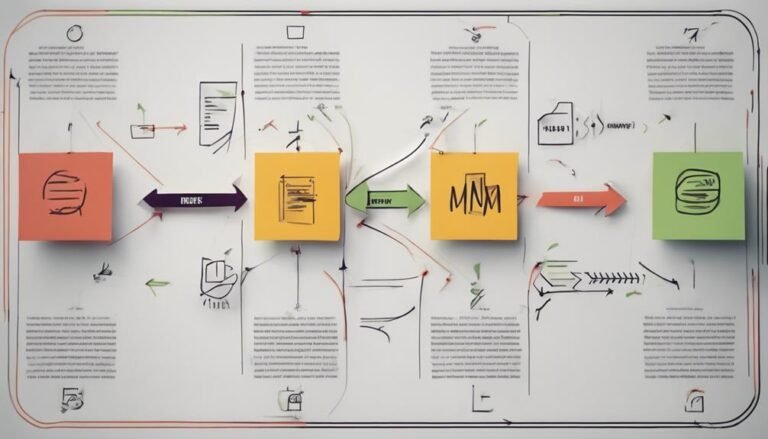Quality Management Systems in SMEs
In the intricate landscape of Small and Medium-sized Enterprises (SMEs), the implementation of Quality Management Systems (QMS) stands as a pivotal factor that can profoundly impact their operations and success.
As SMEs navigate the terrain of ever-evolving market demands and stringent quality standards, the integration of robust QMS becomes not just advantageous but imperative.
However, the journey towards establishing an effective QMS in SMEs is not without its challenges and intricacies. By exploring the nuances of QMS implementation, one can uncover a myriad of strategies and insights that hold the potential to elevate the trajectory of SMEs towards sustained excellence and competitiveness.
Key Takeaways
- QMS implementation boosts operational efficiency and ensures consistent quality in SMEs.
- Continuous improvement through audits and process mapping enhances QMS effectiveness.
- Staff training, culture of improvement, and updated documentation are crucial for QMS maintenance.
- Sustainability in QMS relies on training, knowledge sharing, and process optimization for SMEs.
Importance of QMS in SMEs
Implementing a robust Quality Management System (QMS) is crucial for Small and Medium Enterprises (SMEs) seeking to enhance operational efficiency and ensure consistent product or service quality. A well-structured QMS helps SMEs streamline their processes, leading to improved process efficiency. By clearly defining procedures and responsibilities, companies can reduce errors, minimize waste, and optimize resource allocation, ultimately enhancing productivity. Moreover, focusing on customer satisfaction is a core aspect of QMS implementation. Meeting customer requirements and delivering high-quality products or services not only fosters customer loyalty but also strengthens the brand reputation of SMEs.
In addition to process efficiency and customer satisfaction, QMS plays a vital role in ensuring regulatory compliance and effective risk management for SMEs. Adhering to industry standards and regulations is essential for avoiding legal issues and maintaining business credibility. A well-implemented QMS also helps SMEs identify and mitigate risks proactively, safeguarding the organization from potential disruptions and financial losses. Overall, the strategic adoption of QMS is indispensable for SMEs looking to achieve sustainable growth and competitiveness in the market.
Benefits of Implementing QMS
With the integration of a Quality Management System (QMS) in Small and Medium Enterprises (SMEs), a multitude of advantages become apparent, shaping the foundation for enhanced operational performance and sustainable growth.
- Improved Efficiency: QMS streamlines processes, reduces errors, and enhances productivity, leading to cost savings and increased profitability.
- Enhanced Customer Satisfaction: By focusing on meeting customer requirements and delivering consistent quality, QMS helps in building trust, loyalty, and positive brand reputation.
- Compliance and Risk Management: Implementing QMS aids in ensuring regulatory compliance, mitigating risks, and fostering a culture of continuous improvement within the organization.
The impact of QMS on SMEs is substantial, offering a structured approach to quality assurance and organizational effectiveness. Success factors for QMS implementation include strong leadership commitment, employee involvement, regular training, and a commitment to data-driven decision-making.
While the benefits are significant, it's essential to consider potential drawbacks such as initial implementation costs and the need for ongoing maintenance to sustain the system's effectiveness.
Key Elements of a QMS
What fundamental components constitute the bedrock of a robust Quality Management System (QMS) tailored for Small and Medium Enterprises (SMEs)? Two key elements essential for an effective QMS in SMEs are QMS audits and process mapping.
Key Elements of a QMS:
| Key Elements | Description |
|---|---|
| QMS Audits | Regular evaluation of the QMS to ensure compliance with set standards and identify areas for improvement. Audits help in maintaining quality standards and enhancing overall performance. |
| Process Mapping | Visual representation of the processes within the QMS. Mapping helps in understanding the flow of activities, dependencies, and interactions between different processes. It aids in identifying inefficiencies, bottlenecks, and areas for optimization. |
Incorporating QMS audits ensures continuous monitoring and improvement, while process mapping provides a clear overview of the system's structure and interactions. These elements are foundational in establishing a structured and efficient QMS framework that aligns with the specific needs and objectives of SMEs.
Steps for QMS Implementation
An efficient and successful implementation of a Quality Management System (QMS) in Small and Medium Enterprises (SMEs) requires a methodical approach that encompasses several crucial steps.
- Understanding Implementation Challenges: Identifying potential hurdles such as resistance to change, lack of resources, or inadequate employee buy-in is essential. Addressing these challenges preemptively can smoothen the implementation process.
- Training Requirements for Staff: Providing comprehensive training to employees on QMS principles, processes, and tools is vital for successful implementation. Ensuring that all staff members are well-equipped to understand and contribute to the QMS fosters a culture of quality within the organization.
- Emphasizing Process Improvement and Stakeholder Engagement: Continuous improvement of processes is at the core of QMS. Involving stakeholders at all levels, including employees, suppliers, and customers, ensures that the QMS aligns with organizational goals and enhances overall performance.
Challenges in Maintaining QMS
Maintaining a Quality Management System (QMS) in SMEs presents several challenges that require careful consideration.
Staff training needs are a critical aspect as employees must be well-versed in QMS principles to ensure effective implementation.
Additionally, regular documentation updates and fostering a culture of continuous improvement are essential to sustain a high level of quality within the organization.
Staff Training Needs
Ensuring that staff members receive adequate and ongoing training is crucial for the successful maintenance of Quality Management Systems in SMEs.
Key Points:
- Skill Development: Regular training sessions help employees enhance their skills, stay updated with industry standards, and adapt to new technologies.
- Performance Evaluation: Training needs analysis aids in identifying gaps in employee performance, enabling targeted training programs to improve overall effectiveness.
- Continuous Improvement: By investing in staff training, SMEs foster a culture of continuous learning and improvement, leading to enhanced quality standards and operational efficiency.
Documentation Updates
What challenges do SMEs face when it comes to updating documentation within their Quality Management Systems? SMEs often encounter difficulties in maintaining up-to-date documentation due to limited resources and time constraints. Ensuring that processes are accurately documented and align with the latest standards can be a demanding task for small and medium-sized enterprises. Moreover, keeping track of regulatory changes and incorporating them into the QMS documentation adds another layer of complexity. This can result in potential non-compliance issues and hinder the effectiveness of the quality management system. To overcome these challenges, SMEs need to focus on process optimization and implement robust compliance monitoring practices to ensure that their documentation is always current and reflective of the organization's operations.
| Challenges in Updating QMS Documentation |
|---|
| Limited Resources |
| Time Constraints |
| Regulatory Changes |
| Process Alignment |
| Compliance Monitoring |
Continuous Improvement Culture
Establishing a culture of continuous improvement is pivotal for small and medium-sized enterprises (SMEs) to enhance the effectiveness of their Quality Management Systems (QMS).
To achieve this, SMEs face challenges in maintaining QMS, including:
- Culture Development: SMEs need to focus on fostering a culture that values innovation and continuous improvement to optimize processes effectively.
- Employee Engagement: Ensuring active participation and commitment from employees is crucial for driving performance enhancement within the organization.
- Process Optimization: Constantly reviewing and refining processes is essential for SMEs to adapt to changing market dynamics and improve overall quality management practices.
Tips for QMS Sustainability
To ensure the sustainability of Quality Management Systems (QMS) in SMEs, providing comprehensive training for staff is crucial. This includes educating employees on QMS principles, processes, and their roles in maintaining quality standards.
Additionally, implementing continuous improvement strategies allows for the adaptation and enhancement of the QMS to meet evolving business needs.
Training for Staff
Ensuring comprehensive and ongoing training programs for staff is crucial for maintaining the sustainability of Quality Management Systems (QMS) in Small and Medium Enterprises (SMEs). To achieve this, SMEs should focus on:
- Skills Development: Implementing programs that enhance employees' skills related to QMS practices and procedures.
- Training Programs: Offering regular and structured training sessions to keep staff updated on QMS requirements and best practices.
- Knowledge Transfer: Facilitating knowledge sharing among employees to ensure a collective understanding of the QMS framework.
Continuous Improvement Strategies
Building upon the foundation of robust training programs for staff, continuous improvement strategies play a vital role in enhancing the sustainability of Quality Management Systems (QMS) within Small and Medium Enterprises (SMEs). Implementing process optimization and tracking performance metrics are crucial aspects of continuous improvement. By conducting regular root cause analysis and promptly taking corrective actions, SMEs can address underlying issues affecting their QMS effectively. This systematic approach not only helps in identifying areas for enhancement but also ensures that the QMS remains efficient and aligned with the organization's objectives. The table below illustrates some key strategies for continuous improvement in QMS sustainability:
| Continuous Improvement Strategies | Description |
|---|---|
| Process Optimization | Enhancing operational processes for efficiency and effectiveness |
| Performance Metrics | Tracking and analyzing key performance indicators to monitor QMS effectiveness |
Conclusion
In conclusion, implementing a Quality Management System (QMS) in SMEs is crucial for ensuring consistent quality and customer satisfaction. Studies have shown that companies with a well-implemented QMS experience a 20% increase in efficiency and a 30% reduction in defects.
By focusing on key elements, implementing the necessary steps, and addressing challenges, SMEs can sustain a successful QMS to drive continuous improvement and growth.







